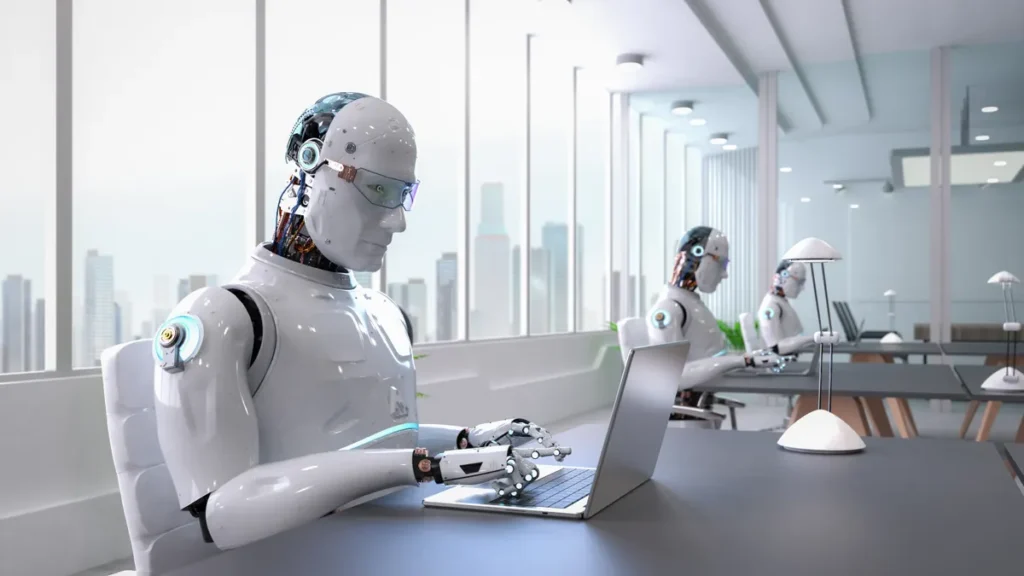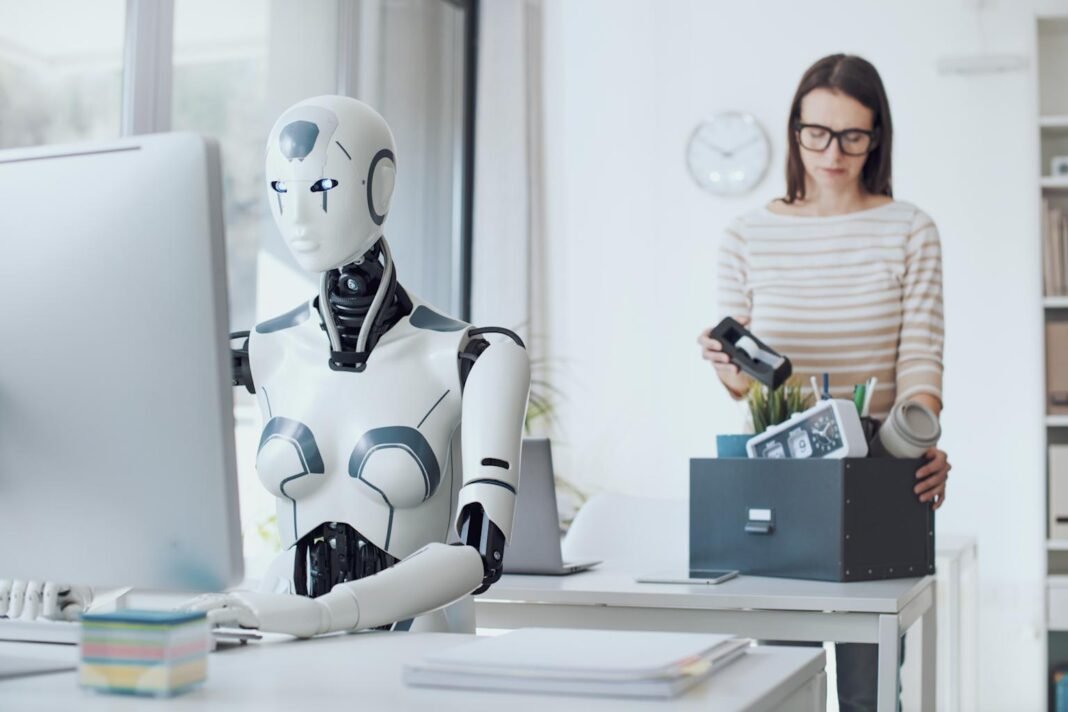
A new survey has revealed a startling reality about the American workforce—74% of US professionals believe that artificial intelligence (AI) will replace their jobs within the next three years. This statistic paints a concerning picture of the uncertainty and anxiety spreading across industries as AI becomes more powerful and widely adopted. With AI tools becoming increasingly capable of performing tasks that once required human intelligence, many employees now find themselves questioning their future in the job market.
This widespread concern is not without reason. Over the last few years, AI has transformed industries such as customer service, marketing, logistics, healthcare, and finance. Intelligent systems are being used to automate emails, analyze big data, write news articles, generate reports, and even provide legal assistance. In this rapidly evolving digital era, the pressure to adapt is growing stronger every day. But while this fear of job loss is real, it does not mean that workers are powerless. In fact, with the right strategies, professionals can remain not only employed but also thrive in an AI-driven world.
The Rising Fear: Why Workers Feel AI Will Take Their Jobs
One of the major reasons so many professionals fear job loss is the speed at which AI is being integrated into workplaces. From simple chatbots to highly intelligent machine learning algorithms, AI systems are replacing tasks once handled by humans. Employees are watching technology take over operations like customer queries, accounting entries, basic legal reviews, and even content writing.
This shift is leading many to believe that AI isn’t just a tool—it’s a replacement. When surveyed, these workers cited reasons such as lack of reskilling opportunities, unclear communication from employers, and the increasing use of cost-cutting automation as causes of their fear. For many, the idea that their job could disappear without a backup plan is deeply unsettling. This anxiety is amplified by media headlines highlighting how businesses are laying off staff after investing in AI.
But the truth is more complex. While some jobs may disappear, new opportunities are being created at the same time. The challenge is not avoiding AI—but learning to work with it.
Which Jobs Are Most at Risk in an AI-Powered Economy?
Jobs that involve routine, repetitive, and rule-based tasks are most vulnerable to AI. Roles such as data entry clerks, customer support agents, telemarketers, cashiers, and some low-level administrative staff are already being replaced by intelligent software. These jobs require little human emotion or creativity, making them easier for machines to perform. For example, many retail stores have already started using self-checkout machines, reducing the need for cashiers. Similarly, AI bots are now handling thousands of customer service inquiries per minute—faster and without fatigue.
However, this does not mean that all jobs are doomed. Roles that involve emotional intelligence, strategic decision-making, creativity, and interpersonal communication are far more difficult for AI to replicate. Professions in leadership, marketing strategy, design, psychology, teaching, and medicine are expected to evolve rather than disappear.
It’s also important to note that AI will change job descriptions even more than it eliminates roles. While some tasks will be automated, new responsibilities will emerge. A customer service agent may now need to oversee chatbot performance rather than answer every query manually.
Embracing Change: AI Is a Tool, Not a Threat
While the fear is understandable, it is crucial to realize that AI is ultimately a tool—and tools are meant to enhance human ability, not replace it entirely. In fact, the World Economic Forum predicts that while AI will displace around 85 million jobs by 2025, it will also create around 97 million new ones. These roles will require a new combination of technical and human skills that only adaptive professionals will be able to offer.
This shift represents a historic opportunity for workers to reinvent themselves and grow. Just like the Industrial Revolution replaced manual labor but created factory jobs, the AI revolution will replace certain cognitive tasks but create a demand for workers who can manage, monitor, and guide AI systems. The key to survival is flexibility and a willingness to learn continuously.
Learning and Upskilling: The Most Important Investment
The most effective way to stay relevant in the job market is to keep learning. Professionals must now treat learning as a lifelong habit. There are countless online platforms offering affordable courses in data science, digital marketing, AI fundamentals, cloud computing, cybersecurity, and project management. These skills are becoming essential across industries, even in fields that were once considered immune to technology.
Moreover, employers are increasingly prioritizing soft skills like communication, leadership, and teamwork. These are areas where AI cannot compete, and they often determine career progression more than technical abilities. Investing in both technical and soft skills is the best way to future-proof your career.
In today’s economy, having just a college degree is no longer enough. To remain competitive, workers need to earn certifications, learn new software, stay updated with trends, and constantly build on their knowledge. Those who make the effort to evolve are the ones who will rise as leaders in the AI era.
Shifting Mindsets: Be Flexible and Open to New Roles
One of the most important changes professionals need to make is in their mindset. Holding on to one job title or career path is no longer practical in today’s fast-changing world. Being willing to switch roles or explore adjacent career paths can unlock new opportunities. For example, someone working in customer service may transition into AI bot training, UX design, or technical support.
It’s not about starting over—it’s about applying your existing experience in a new context. By staying open-minded, workers can discover jobs they may not have previously considered but are now in high demand. Being flexible not only helps you stay relevant but also makes you more attractive to employers looking for dynamic and adaptable employees.
Build a Strong Online Presence and Personal Brand
In today’s digital world, your online presence is your resume. Platforms like LinkedIn offer professionals the chance to showcase their expertise, build their personal brand, and connect with recruiters and thought leaders. Posting updates about your learning journey, certifications, or industry insights shows that you’re active, engaged, and serious about your career.
Building your personal brand also means being seen as a thought leader in your niche. Even sharing articles and commenting on industry trends can put you on the radar of employers and clients. A strong personal brand gives you a competitive edge and opens doors to freelance gigs, collaborations, and speaking opportunities.
Stay Updated: Knowledge is Your Power
To survive in the AI era, you must stay informed. The world is changing quickly, and those who keep up with trends will be better prepared for the future. Subscribing to industry newsletters, reading technology blogs, watching YouTube explainers, or listening to podcasts can help you understand how AI is impacting your field.
Being informed allows you to anticipate changes and act before others. Whether it’s adopting a new software early or learning a new tool before it becomes mainstream, staying one step ahead can keep your career moving forward.
Build Experience Through Side Projects
If you’re worried about AI replacing your job, start building something that AI can’t. Working on personal projects, freelancing, or volunteering not only helps you practice new skills but also shows initiative. Whether it’s launching a blog, running an Instagram page for your hobby, or helping a nonprofit with marketing, these experiences matter.
They give you real-world skills, which are often more impressive than certificates alone. They also allow you to experiment, make mistakes, and grow. Over time, your side hustle might even turn into a full-time income stream—giving you more freedom and control over your future.
The Role of Employers in Shaping the Future of Work
While individual workers must adapt, companies also have a responsibility to support their workforce during this transformation. Employers should invest in reskilling programs, provide transparent communication about how AI will be used, and ensure that employees are prepared for their new roles.
By offering internal training, mentorship programs, and AI education, companies can build a workforce that’s both loyal and future-ready. Organizations that treat employees as partners in innovation will see more productivity and less resistance to technological change.
The fear that AI will replace jobs in the next 3 years is based on real changes happening around us. But fear doesn’t have to turn into helplessness. You still have time to learn, evolve, and secure your place in the future of work.AI may replace certain tasks, but it can’t replace the uniquely human qualities of creativity, empathy, and critical thinking. The most successful professionals in the next decade will be those who embrace AI, not avoid it. Use AI to your advantage, stay curious, and invest in yourself. Your future is still in your hands.































